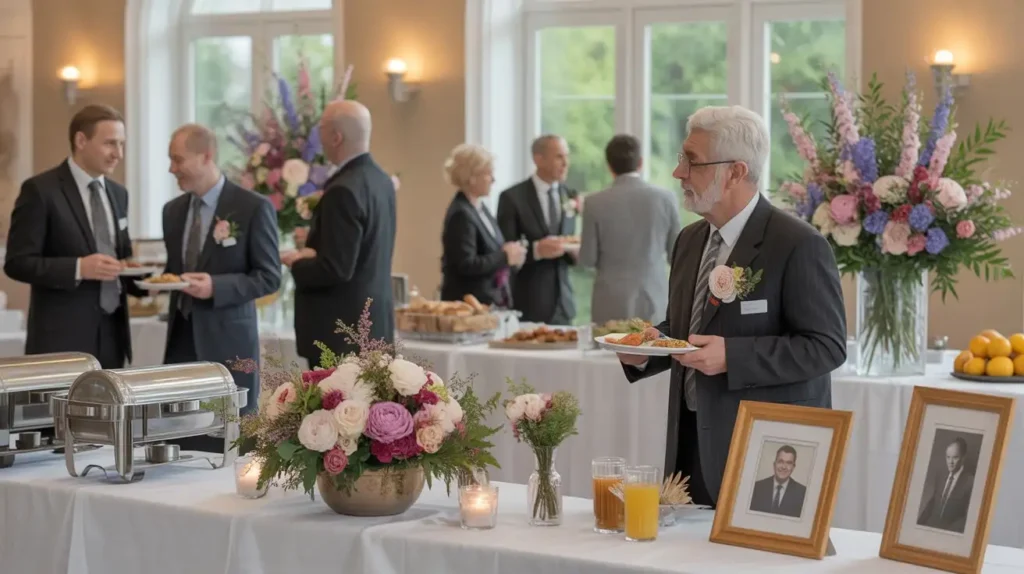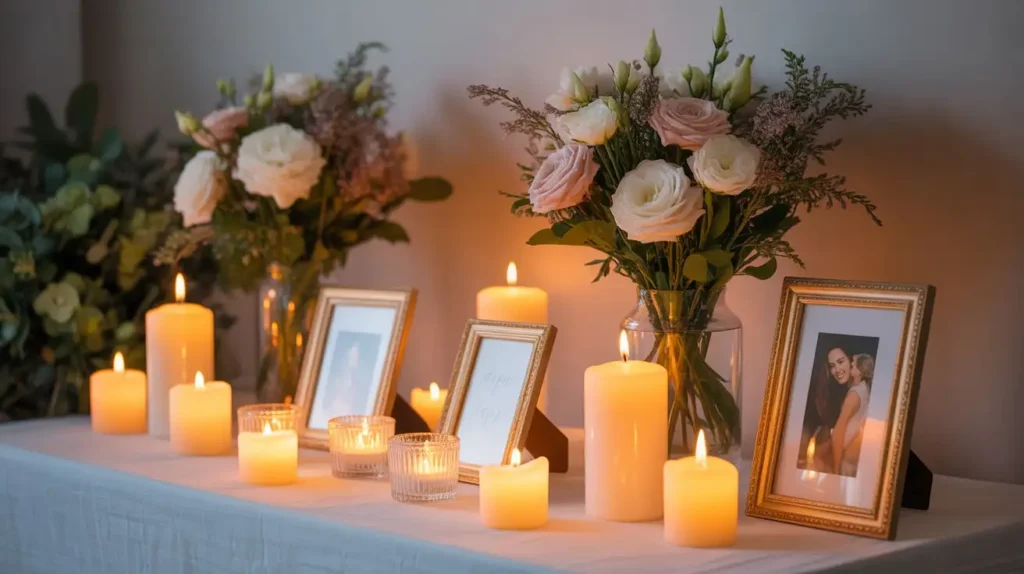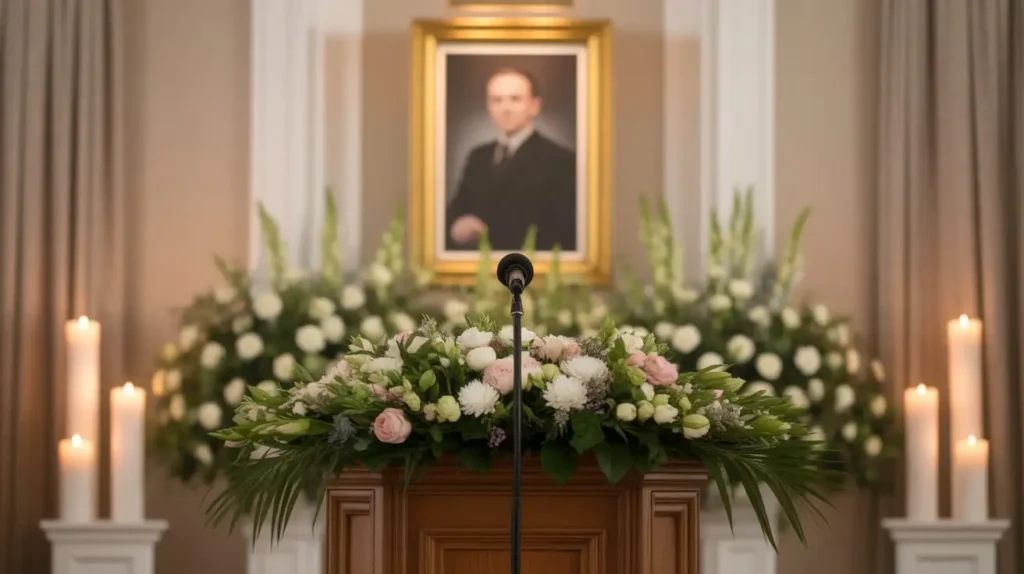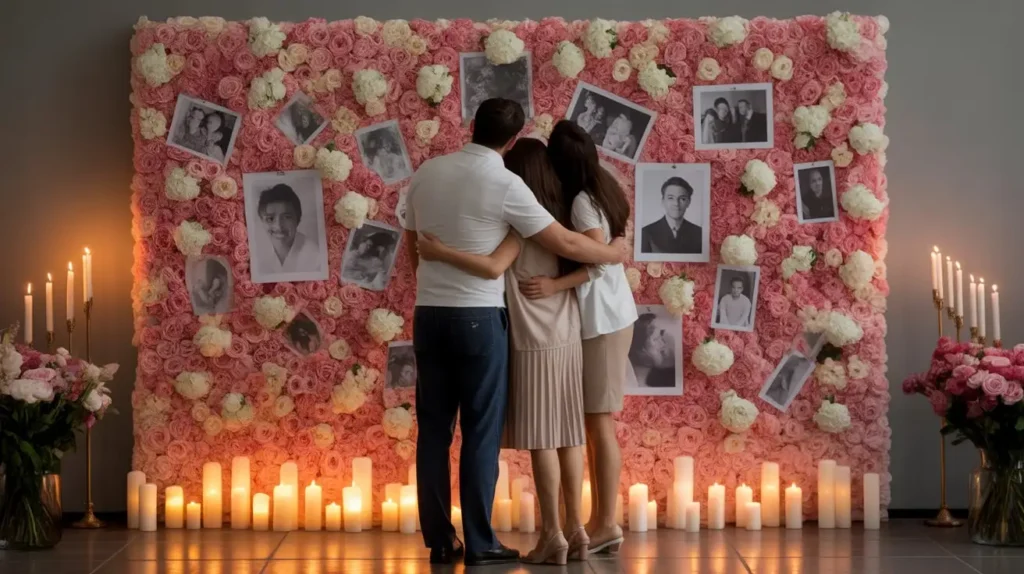When someone you love passes away, the pressure to plan a perfect tribute can feel overwhelming. You might find yourself wondering how to honor your loved one’s life and memory in a way that truly captures who they were—not just as a name and date on a program, but as the vibrant, complex person everyone knew and loved. The good news? A celebration of life gives you the freedom to break away from very traditional funerals and create something as unique as the individual you’re honoring.
Unlike a traditional funeral service, a celebration of life focuses on the positive aspects of the deceased’s life rather than solely mourning their passing. It’s a chance to share stories, laugh at favorite memories, and pay tribute in ways that reflect your loved one’s personality. And while the planning process might seem daunting, you don’t have to navigate it alone. The compassionate team at Eternally Loved understands that every person deserves a meaningful life service, tribute, and they’re here to help turn your vision into reality during this difficult time.
Creating Your Own Life Ideas
Funerals follow a familiar structure—the viewing, the service, the burial. But a celebration of life throws that traditional funeral order out the window. There’s no right or wrong way to honor someone’s memory, which means you have complete creative freedom.
Some choose to hold the event at a funeral home for convenience, while others pay tribute at a location that held special significance to their loved one. A sports lover might be celebrated at their favorite stadium. An artist’s memorial service could take place in a gallery surrounded by their work. A nature enthusiast might be honored in their favorite park, where the inviting atmosphere naturally encourages guests to share memories and connect with one another.
The beauty of stepping away from tradition is that you can make the event feel less like a somber obligation and more like a true reflection of how your loved one lived. If they hated formality, why force it? If they loved casual gatherings with hot chocolate and comfort food, that’s exactly what their celebration should include.
Creating a Memory Table That Tells Their Story

One of the most touching ways to help guests connect with your loved one’s life is through a thoughtfully curated memory table. This isn’t just a collection of framed photos—it’s a visual narrative that invites people to pause, remember, and smile.
Start with photos that span different life chapters. Include childhood pictures, milestone moments, candid shots with family and friends, and images that capture their unique personality. But don’t stop at photographs. Add other memorabilia that tells a richer story: their favorite book with dog-eared pages, the fishing lure they swore by, ticket stubs from concerts they attended, or handwritten recipes they perfected over the years.
Many create a memory board where guests can pin their own photos or write down their favorite moment in life they shared with the deceased. This interactive element transforms passive observers into active participants in the tribute. The surviving family often finds these contributions become treasured keepsakes, offering glimpses into relationships and moments they might not have known about.
Eternally Loved can help you design a memory table that strikes the right balance between meaningful and manageable. Sometimes the hardest part is knowing what to include and what to save for private reflection, especially when emotions are running high.
Music That Moves Hearts
Music has an incredible power to evoke emotions and transport us back to specific moments. When planning your celebration of life, the soundtrack you choose can make all the difference between a generic event held and a heartfelt experience.
Forget somber music if your loved one preferred upbeat melodies. Play their favorite songs—even if they’re unconventional funeral choices. Did they blast classic rock while working in the garage? Include it. Did they have a guilty pleasure pop song they’d sing terribly in the car? That belongs there too. Meaningful music isn’t about what’s “appropriate” for a funeral or memorial service; it’s about showing in a comforting way what genuinely represents the person you’re honoring.
Consider having live music if your loved one was musical or had friends or family who could perform. A grandchild playing piano, a friend singing a favorite hymn, or a local band covering beloved songs adds a personal touch that recorded music simply can’t match. These special moments connect people and often become the most memorable parts of the entire event.
Some families create a playlist that guests can take home—a living tribute that keeps their loved one’s memory alive long after the celebration ends. Others set up a listening station at the venue where people can experience meaningful music through headphones, creating intimate moments of reflection.
Sharing Stories in Creative Ways
The heart of any remarkable celebration lies in the stories people share. But standing up to speak in front of a crowd isn’t for everyone, and a traditional funeral service format can make sharing feel rigid and rehearsed.
Create opportunities for story-sharing that accommodate different comfort levels. Set up a video recording booth where guests can share memories on camera in their own words. These recordings become priceless for family members who want to hear how others experienced their loved one, and they preserve memories for future generations who never got the chance to meet them.
For those who prefer writing, provide beautiful cards where guests can pen favorite memories, funny anecdotes, or personal tributes. These written memories can be compiled into a memory book that the bereaved family can return to whenever they need comfort.
Some celebrations include an open mic segment during the event, but make it genuinely open—let people know they can share a two-sentence memory or a longer story, whatever feels right. Encourage guests to be authentic. The goal isn’t polished eulogies; it’s real connection through shared experience.
The team at Eternally Loved has seen how powerful these story-sharing moments can be. They can help you set up systems that make it easy for guests to contribute, whether that’s through technology, traditional methods, or a combination of both.
Tribute Videos
In our digital age, tribute videos have become a beautiful way to compile decades of memories into a few meaningful minutes. These videos can play during the celebration, giving guests a visual journey through your loved one’s life set to their favorite music.
Creating a tribute video doesn’t require professional videography skills. Simple slideshows with photos, video clips, and meaningful quotes can be incredibly moving. Many families include footage from family gatherings, vacations, or ordinary moments that capture their loved one’s essence. The key is choosing images and clips that show personality—the genuine smile, the characteristic gesture, the way they interacted with the people they loved.
Websites
Memorial websites extend the tribute beyond a single event. These online spaces allow people who couldn’t attend to pay their respects, share their own photos and memories, and stay connected with the family. For out-of-town relatives and friends scattered across the country, a website becomes a virtual gathering place.
You can also use these platforms to collect photos from guests. Many people have pictures on their phones they’d love to share but might not think to bring physical copies. A website with upload capability ensures those images aren’t lost.
While creating these digital tributes might feel technically overwhelming during an already difficult time, this is exactly where having support makes all the difference. The compassionate staff at Eternally Loved can guide you through the process or even handle the technical details entirely, letting you focus on choosing the memories that matter most.
Location, Location, Location
The venue you choose sets the entire tone for the celebration. A funeral home offers convenience and familiar infrastructure, but a meaningful location connected to your loved one’s life can transform the event into something truly special.
Think about where your loved one felt most themselves. A beach where they watched countless sunsets. The community center where they volunteered. Their own backyard, where they hosted summer barbecues for years. The library where they spent Saturday mornings. A hiking trail they loved. Even a brewery or sports bar if that’s where they connected with friends.
Outdoor venues create an inviting atmosphere that naturally puts people at ease. Nature provides its own beautiful backdrop, and the informal setting encourages genuine conversation and memory-sharing. Just be sure to have a backup plan for weather, and check local regulations regarding what’s permitted.
Some locations require more creativity when it comes to logistics—you’ll need to think about seating, sound systems, and how to handle the individual’s physical remains if that’s part of the ceremony. But these practical considerations are manageable, especially with experienced guidance.
Eternally Loved works with families to navigate venue selection and logistics, helping you understand what’s possible and what might present challenges. They can coordinate with venues, handle permits, and ensure all the meaningful details come together seamlessly.
Interactive Elements That Engage Guests

The most memorable celebrations give guests something to do beyond sitting and listening. Interactive elements transform attendees from an audience into active participants in honoring your loved one’s memory.
Set up a planting station where guests can pot a seed or small plant to take home—a living tribute that grows and changes, just as grief and healing do. As future generations care for these plants, they carry forward a tangible connection to someone they loved.
Create a time capsule where guests can contribute letters, photos, or small items. The capsule can be opened on a meaningful anniversary, allowing the family to revisit those raw, immediate memories after time has passed.
For a loved one who valued service, organize a charitable activity as part of the celebration. Guests could assemble care packages, write cards for hospitality workers, or contribute to a scholarship fund in the deceased’s name. This transforms grief into action and extends your loved one’s impact beyond their lifetime.
A memory jar invites guests to write down their favorite moments with the deceased and place them in a decorative container. The grieving family can pull these out whenever they need a reminder of how deeply their loved one touched others’ lives.
Art-based activities work beautifully too. Provide canvases and paints for a collaborative artwork, or set up a quilt square station where people decorate fabric pieces that will be sewn into a memorial quilt. These creative projects give people something to do with their hands while they process emotions, and they result in lasting physical tributes.
Food and Drink That Reflects Personality
Food brings people together, and a celebration of life is no exception. But instead of standard catering fare, consider serving your loved one’s favorite dishes. This simple choice adds a personal touch that guests will notice and appreciate.
Did they make legendary barbecue? Hire a local pit master or recreate their recipe. Were they known for their holiday cookies? Bake batches to share. Did they have a signature cocktail or always keep a specific snack on hand? Include it in the menu.
Some families go with a potluck approach, asking guests to bring dishes that remind them of the deceased or that they once shared together. This creates variety and gives attendees a way to contribute meaningfully. It also sparks conversations—“Oh, I remember when she made this for…” becomes a natural story-sharing prompt.
Don’t feel bound by typical funeral reception food. If your loved one preferred pizza and beer over fancy hors d’oeuvres, honor that. If they were adventurous eaters who loved trying new foods from different cultures, create a diverse menu that reflects their culinary curiosity.
Beverage choices matter too. Set up a coffee bar if they lived on caffeine, or a hot chocolate station if that was their comfort drink. Include their favorite wine, beer, or non-alcoholic beverage. These details might seem small, but they’re the meaningful touches that make guests feel like they’re genuinely celebrating the person, not just attending an obligatory event.
Incorporating Hobbies and Passions
Your loved one’s hobbies and interests offer rich material for creating a celebration life ideas. These passions defined how they spent their time and energy—why not let them define how we remember them?
For the devoted gardener, hold the service in a memory garden or botanical space. Provide seed packets as favors so guests can grow flowers that bloom in remembrance. Display their gardening tools, favorite plants, or photos of their prized roses.
If they were a book lover, host the celebration in a library or bookstore. Create centerpieces from their favorite titles. Invite guests to take home a book from their collection with a personal inscription inside. Share quotes from literature they loved.
Sports Enthusiasts
Sports enthusiasts deserve sports-themed celebrations. Wear team jerseys, serve ballpark food, play highlight reels from their favorite team’s greatest moments. If they participated in sports, display their equipment, medals, or team photos.
Travelers
For those who loved travel, create a visual journey through the places they visited. Set up a map where guests can mark locations they visited together or place they’d like to travel in the deceased’s honor. Display souvenirs, create tablescapes inspired by favorite destinations, or serve foods from countries they explored.
Live Music and Artists
Musicians and artists should be celebrated with their work front and center. Display paintings, photographs, or crafts they created. Play recordings of their performances. Invite attendees to create art inspired by the deceased’s style.
The planning process for these themed elements can feel overwhelming when you’re already dealing with grief. This is where the team at Eternally Loved becomes invaluable—they’ve helped countless translate their loved ones’ passions into meaningful celebration elements, and they understand how to execute these creative ideas practically.
Honoring Cultural Heritage and Beliefs
While a celebration of life offers freedom from traditional structure, many want to incorporate elements from their cultural or religious heritage. This blend of tradition and personalization honors both the deceased’s beliefs and their individual personality.
You might include a group prayer or moment of silence while also featuring music that wouldn’t appear in a traditional religious service. You could follow certain cultural customs for handling the physical remains while hosting the celebration in a non-traditional venue. A church minister might perform certain rites, while family and friends share funny anecdotes.
The key is determining which traditions feel meaningful versus obligatory. Some families discover that very traditional funerals don’t align with how their loved one actually lived or what would provide the most comfort to the bereaved family. Others find that certain rituals offer essential structure during chaos.
Many create hybrid events that honor multiple traditions when the deceased came from diverse cultural backgrounds or when family members have different beliefs. This inclusive approach ensures everyone feels their perspective is valued while keeping the focus on the person being remembered.
Working with experienced professionals who understand various cultural and religious traditions can help you navigate these decisions respectfully and thoughtfully.
Keepsakes and Takeaways
Sending guests home with a small remembrance ensures your loved one’s memory continues beyond the event itself. These keepsakes don’t need to be expensive—they need to be meaningful.
Memorial cards remain popular, but consider adding a personal touch beyond the standard format. Include a favorite quote, a brief funny story, or a piece of advice your loved one often shared. Add a photo that captures their personality rather than a formal portrait.
Seed packets or small plants offer a living tribute guests can nurture. Each time they see the growing plant, they’ll think of the person you’re honoring.
Bookmarks featuring a favorite quote or photo work well for readers. Recipe cards with the deceased’s signature dish let guests recreate meals in their memory. Donate to a cause they cared about in each guest’s name and provide cards explaining the contribution.
Some create custom items like candles with labels featuring the deceased’s photo and dates, or small stones engraved with a meaningful word or phrase. Others compile favorite recipes into a small cookbook or create playlists of their loved one’s favorite songs available via QR code.
The most touching keepsakes often connect directly to specific memories. If your loved one always had butterflies in their garden, butterfly-themed items make sense. If they collected a specific item, miniature versions honor that passion.
Making It Authentically Theirs

The most important advice for planning a unique celebration of life? Trust your instincts about what your loved one would have wanted. If an idea makes you smile because it’s so perfectly “them,” it probably belongs in the celebration—even if it’s unconventional.
Maybe they had a quirky sense of humor that should be reflected in the tone of the event. Perhaps they valued simplicity and would prefer a small, intimate gathering over a large production. They might have loved grand gestures and would want every detail to be spectacular.
Don’t let concerns about what’s “appropriate” override what’s authentic. If your loved one lived boldly and colorfully, their celebration should reflect that. If they were quietly spiritual, honor that gentler energy. If they brought people together through food and laughter, create space for exactly that.
The goal isn’t to create what others expect. It’s to create a heartfelt tribute that helps everyone present connect with the beautiful, complicated, thoroughly unique person you’re all there to remember. When you achieve that, you’ve given everyone—including yourself—a meaningful way to process grief, celebrate a life well-lived, and begin the healing process.
Eternally Loved can Help Your Celebration of Life
When you’re ready to plan a celebration of life that truly honors your loved one’s unique story, the compassionate team at Eternally Loved is here to help. We understand that during one of life’s most difficult times, you need support that’s both practical and heartfelt. Call us today to discuss how we can help you create a meaningful tribute without the overwhelm.
Frequently Asked Questions
How soon after death should a celebration of life be held?
Unlike funerals that typically occur within days of death, celebrations of life can happen on a timeline that works for your family. Some choose to hold them within a week or two, while others wait several weeks or even months. This flexibility allows time for out-of-town relatives to make travel arrangements, for you to plan thoughtfully rather than rushing, and for the initial shock of loss to settle slightly. Many families find that waiting a bit gives them more emotional space to create a truly meaningful event. There’s no wrong timing—choose what feels right for your situation.
Is it appropriate to have alcohol at a celebration of life?
Yes, if it fits your loved one’s personality and preferences. Many celebrations of life include the deceased’s favorite beverages, whether that’s wine, beer, cocktails, or non-alcoholic options. The key is considering your specific guest list and venue. If you’re hosting at a religious venue, there may be restrictions. If children will be present or if some family members have concerns about alcohol, you might offer both alcoholic and non-alcoholic options. Ultimately, if your loved one enjoyed social drinking and it would feel authentic to include it, there’s nothing inappropriate about serving alcohol at their celebration.
Can we have both a traditional funeral and a celebration of life?
Absolutely. Many families hold a traditional funeral service for immediate family and close friends, then host a larger celebration of life weeks later. This approach honors those who need traditional religious or cultural rituals while also creating space for a more personalized event. The funeral can address the immediate need for closure and provide formal rites, while the celebration becomes a longer, more relaxed gathering focused on sharing memories and honoring personality. Some families also do the reverse—a celebration first, then a private traditional service later.
What if we can’t afford an elaborate celebration?
A meaningful celebration of life doesn’t require a large budget. Some of the most touching tributes happen in backyards with potluck food and handmade decorations. Focus on personal elements rather than expensive ones—displaying photos costs nothing, having loved ones share stories is free, playing the deceased’s favorite music requires only a speaker and phone. Choose a free or low-cost venue like a park, beach, or someone’s home. Ask friends and family to contribute specific items or tasks rather than hiring everything out. The compassionate team at Eternally Loved can help you create a beautiful, meaningful event and help you decide if a planner meets your budget constraints. What matters most is the love and thought you put into honoring your person, not the price tag.
Should children attend a celebration of life?
This depends on the children’s ages, their relationship to the deceased, and the tone of the event. Celebrations of life are generally less formal and somber than traditional funerals, which can make them more appropriate for children. However, consider whether the event will include elements that might be scary or confusing for young kids. If you do include children, prepare them beforehand about what to expect, assign an adult to look after them if needed, and consider providing a quiet space where they can take breaks. Many families find that including children helps normalize grief and allows kids to participate in honoring someone they loved. Other families prefer adults-only events. Neither choice is wrong—it’s about what works for your family and the specific celebration you’re planning.

